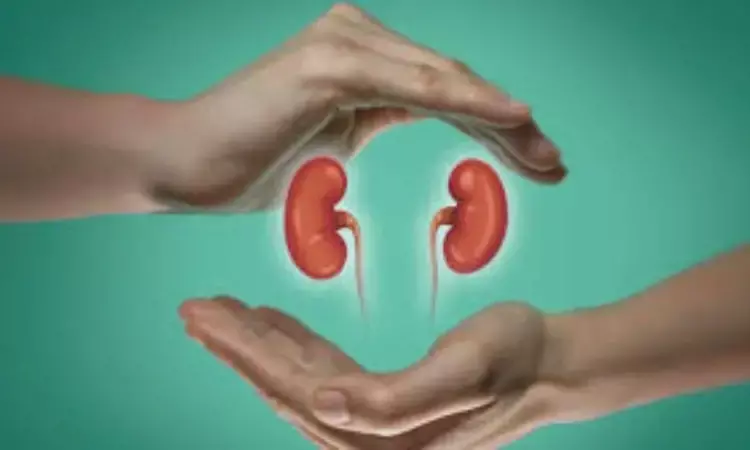- Home
- Medical news & Guidelines
- Anesthesiology
- Cardiology and CTVS
- Critical Care
- Dentistry
- Dermatology
- Diabetes and Endocrinology
- ENT
- Gastroenterology
- Medicine
- Nephrology
- Neurology
- Obstretics-Gynaecology
- Oncology
- Ophthalmology
- Orthopaedics
- Pediatrics-Neonatology
- Psychiatry
- Pulmonology
- Radiology
- Surgery
- Urology
- Laboratory Medicine
- Diet
- Nursing
- Paramedical
- Physiotherapy
- Health news
- Fact Check
- Bone Health Fact Check
- Brain Health Fact Check
- Cancer Related Fact Check
- Child Care Fact Check
- Dental and oral health fact check
- Diabetes and metabolic health fact check
- Diet and Nutrition Fact Check
- Eye and ENT Care Fact Check
- Fitness fact check
- Gut health fact check
- Heart health fact check
- Kidney health fact check
- Medical education fact check
- Men's health fact check
- Respiratory fact check
- Skin and hair care fact check
- Vaccine and Immunization fact check
- Women's health fact check
- AYUSH
- State News
- Andaman and Nicobar Islands
- Andhra Pradesh
- Arunachal Pradesh
- Assam
- Bihar
- Chandigarh
- Chattisgarh
- Dadra and Nagar Haveli
- Daman and Diu
- Delhi
- Goa
- Gujarat
- Haryana
- Himachal Pradesh
- Jammu & Kashmir
- Jharkhand
- Karnataka
- Kerala
- Ladakh
- Lakshadweep
- Madhya Pradesh
- Maharashtra
- Manipur
- Meghalaya
- Mizoram
- Nagaland
- Odisha
- Puducherry
- Punjab
- Rajasthan
- Sikkim
- Tamil Nadu
- Telangana
- Tripura
- Uttar Pradesh
- Uttrakhand
- West Bengal
- Medical Education
- Industry
Even Mild CKD Elevates Infection Risk, Study Finds

Chronic Kidney Disease
Researchers have determined in a new study published in EClinicalMedicine that patients with chronic kidney disease (CKD), even at its earliest stages, have a substantially elevated risk of requiring hospitalization for serious infection. The results concluded that reduced kidney function and increased excretion of albumin in the urine are independently and stepwise related to increased risk of infection, even in individuals with only mildly decreased kidney function. The study was conducted by Junichi I. and colleagues.
In this large, meta-analysis, one of the Chronic Kidney Disease Prognosis Consortium (CKD-PC), data from 47 international cohorts with 1,246,912 participants were combined. The investigators compared estimated glomerular filtration rate using serum creatinine (eGFRcr) and urinary albumin-to-creatinine ratio (ACR) to determine the association of these biomarkers with infection-related hospitalization. Infections were infections of the respiratory, urinary, skin, gastrointestinal, genital, nervous, and cardiovascular tracts, and sepsis. Follow-up information was collected through December 31, 2019.
This analysis employed individual participant data from 1.2 million people in 47 cohorts worldwide, for which their eGFRcr and ACR were measured. Both the markers were analyzed as continuous and categorical markers. Acute infection hospitalization was monitored through discharge diagnostic codes, with follow-up censored in December 2019 or at cohort closure. Cox models of proportional hazards were employed to calculate the hazard ratios (HRs) for risk of infection associated with kidney function and with levels of albuminuria.
Key Findings
• Of more than 1.2 million participants, 170,864 persons (13.7%) were hospitalized for infections in follow-up.
• The overall rate of incidence (IR) was 22.0 per 1000 person-years (interquartile interval: 16.2–31.0).
• Relative to those with eGFRcr 90–104 ml/min/1.73 m² and ACR <10 mg/g:
• Patients with eGFRcr 60–89 had an HR of 1.09 (95% CI: 1.06–1.13)
• Individuals with eGFRcr 45–59 had an HR of 1.39 (95% CI: 1.34–1.45)
• ACR 10–29 mg/g was correlated with an HR of 1.40 (95% CI: 1.33–1.47)
• ACR 30–299 mg/g had an HR of 1.82 (95% CI: 1.72–1.92)
• Individuals with extremely high eGFRcr ≥105 ml/min/1.73 m² also had higher infection risk (HR: 1.22; 95% CI: 1.17–1.26)—a surprising result indicating non-linear relations at extreme levels.
• The highest risk was seen in those with both extremely low eGFRcr (<30 ml/min/1.73 m²) and elevated ACR (≥300 mg/g), with combined HR of 6.27 (95% CI: 5.70–6.90)—more than six times as high as the reference group.
• These trends were consistent regardless of the type of infection. For instance, HR of lower respiratory tract infections was 1.26 (95% CI: 1.22–1.30) per 15 ml/min/1.73 m² reduction in eGFRcr, and 1.48 (95% CI: 1.44–1.53) per 8-fold rise in ACR.
Risk of infection in CKD patients is significant, and this risk starts early in the progression of kidney impairment. The authors of the study concluded that both worsening kidney function and rising albuminuria are independent, additive predictors of hospitalization with infection. These results necessitate specific infection prevention measures not only in those with severe CKD but also in people in preceding stages of kidney disease.
Reference:
Ishigami, J., Surapaneni, A., Matsushita, K., Coresh, J., Grams, M. E., Ballew, S. H., Sang, Y., Stengel, B., Ärnlöv, J., Bell, S., Carrero, J.-J., Chang, A. R., Ciemins, E. L., Haynes, R., Ix, J., Kotsis, F., Lees, J. S., Pandit, K., Rao, P., … Surapaneni, A. (2025). Estimated glomerular filtration rate, albuminuria, and risk of infection: a collaborative meta-analysis of individual participant data. EClinicalMedicine, 86(103372), 103372.https://doi.org/10.1016/j.eclinm.2025.103372•
Dr Riya Dave has completed dentistry from Gujarat University in 2022. She is a dentist and accomplished medical and scientific writer known for her commitment to bridging the gap between clinical expertise and accessible healthcare information. She has been actively involved in writing blogs related to health and wellness.
Dr Kamal Kant Kohli-MBBS, DTCD- a chest specialist with more than 30 years of practice and a flair for writing clinical articles, Dr Kamal Kant Kohli joined Medical Dialogues as a Chief Editor of Medical News. Besides writing articles, as an editor, he proofreads and verifies all the medical content published on Medical Dialogues including those coming from journals, studies,medical conferences,guidelines etc. Email: drkohli@medicaldialogues.in. Contact no. 011-43720751


